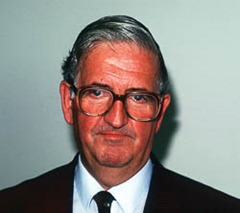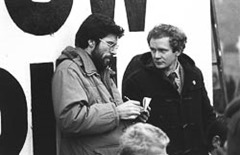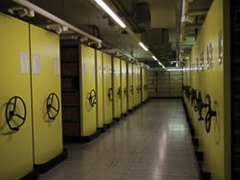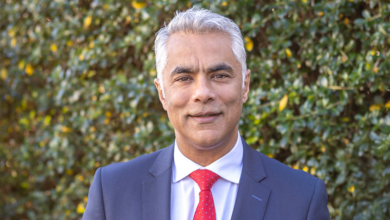Recalling 1985
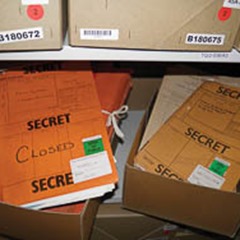 Peter Cheney reviews the 1985 archives, which detailed opinions on Peter Robinson and John Hume, and assessed the prospects for gas from the fields of County Fermanagh.
Peter Cheney reviews the 1985 archives, which detailed opinions on Peter Robinson and John Hume, and assessed the prospects for gas from the fields of County Fermanagh.
Peter Robinson earned high respect from the Head of the Civil Service, Ken Bloomfield, after an external conference on Northern Ireland in January 1985. John Hume, meanwhile, was dismissed for holding too tightly to the previous year’s New Ireland Forum report.
The talks at Airlie House in Virginia were convened by Padraig O’Malley – a political scientist who currently works at the University of Massachusetts. Peter Robinson, Jim Allister and Sammy Wilson represented the DUP in talks with the other constitutional parties and the British and Irish governments. Robert McCartney was a leading member of the UUP delegation.
Ken Bloomfield was part of the delegation led by NIO Parliamentary Under-Secretary Chris Patten. He commented that “three days’ exposure to Peter Robinson amply demonstrated what a forceful, articulate and crafty politician he is” and the unionist parties “won hands down”.
The SDLP, he commented, was seen as performing poorly even by its American supporters. In a cutting remark, he wrote that John Hume is “widely regarded” in the USA “as occupying a position somewhere between Charles Stewart Parnell and Mother Theresa”. Bloomfield’s conclusion was that Hume looked like “a man who has lost a fortune by backing a particular number consistently at the roulette table and continues to stare at that number even though he no longer has a stake to play.” John Hume was dismissed as “politically bankrupt” in Bloomfield’s analysis.
Bloomfield noted that distance from Northern Ireland “itself encourages at least a less strident tone, and late at night relaxation can be (and was) facilitated by liberal hospitality of the liquid kind.”
Ironically, by the end of 1985, the Anglo-Irish Agreement was viewed as a major ‘win’ for the SDLP while unionists were not consulted about the deal.
Thirteen years later, Hume delivered the Good Friday Agreement and his continued support for it came at a high cost for his party. agendaNi contacted Ken Bloomfield but he did he did not wish to comment on the release.
Permanent secretaries were asked to contribute to a wide-ranging policy review in 1985. Ken Bloomfield noted: “It is clear that colleagues have not found it an easy task compress into rather concise statements a complex of aims and objectives covering such wide areas of policy.”
The primary aim of economic policy was “to bring the supply of and demand for labour into better balance.” Sustaining as many jobs as possible at Harland and Wolff was a key driver. Public spending accounted for 70 per cent of GDP compared with 40 per cent in Great Britain. The private sector’s response “has not been sufficient to prevent unemployment growing.”
Priorities included a corporation tax relief grant, a youth training programme, promoting Northern Ireland’s interests in CAP negotiations, and exploring lignite-powered generation to help control energy costs. In terms of social policy, the departments sought to reduce “disparities” between the Protestant and Catholic communities “thereby encouraging political stability and reducing alienation.”
Over the next year, the Department of the Environment aimed to “review and roll forward” the house-building strategy. Responsibility for children with special needs was being transferred from the Department of Health and Social Services (DHSS) to the Department of Education. In a now-familiar turn of phrase, the DHSS would review “the balance of care between acute hospitals and community services.” It also looked forward to the opening of the Belfast City Hospital tower block.
Gas from Fermanagh
It’s interesting to see how some stories in the archives have since reappeared in a slightly different form. Media reports in early 1985 suggested that gas discovered in Fermanagh could be sold on to the Republic to bolster Northern Ireland’s struggling economy. Ireland was already benefitting from the Kinsale field, which had come on stream in 1978.
A young Noel McAdam, writing for the News Letter, interviewed the DUP’s Rev William Beattie about its prospects. “For years the government has been willing to close the gas industry down, yet this gas in Fermanagh could be the industry’s saviour,” Beattie remarked. A prospecting company, North West Gas and Oil, said that it was cautiously optimistic.
In an internal memory dated 13 February, civil servant JE Wolstencroft noted that the area was “geologically promising” but there was “as yet no evidence of commercially exploitable gas reserves in the area.”
Little had changed by August of that year and the department was wary of any hype that could raise false expectations. Wolstencroft wrote that press reports were “usually associated with attempts by companies to attract private risk capital in public floatations” and this speculation “normally does not reflect any hard evidence”. He also rejected the argument that new gas supplies could protect town gas as commercial exploration would only take place several years into the future. Town gas production ceased in 1987.
On 14 November 1984, Ulster Unionist MPs called on the British Government to “proscribe Sinn Fein as a political party until such time as it eschews supports for the Provisional Irish Republican Army from which it is indistinguishable.”
Minister of State Rhodes Boyson, who had clearly seen the early day motion, wrote to Secretary of State Douglas Hurd later that day. It was “difficult to continue” the current policy of allowing Sinn Féin to contest elections but refusing to meet their elected representatives.
This allowed the party to “claim that we are rejecting or ignoring the democratic ballot – a Northern Ireland Ken Livingstone could score many goals on this!” The Conservatives were abolishing the elected Greater London Council, which Livingstone was leading.
“I have no solution apart from an outlawing of Sinn Fein,” Boyson stated, before adding that the Government needed to have “a clearly defined joint policy” with its counterparts in Dublin. Earlier papers show that proscription had been considered in 1983 but ministers decided that this would probably be counter-productive.
Boyson also raised the theoretical – and very unlikely – possibility of Gerry Adams taking the oath of allegiance and asking questions in Parliament. In that situation, ministers “would have to answer directly.”
The British embassy in Dublin meanwhile assessed the Irish Government’s apparent hard line on side-lining Sinn Féin. “Inevitably things so wrong,” Ambassador Alan Goodison lamented in a telegram dated 16 May 1985. The Minister for Labour – Ruairí Quinn – found himself in the company of five Sinn Féin councillors “by mistake” when launching a job creation scheme in Sligo. Sinn Féin representatives “sometimes contrive to be photographed with a minister … it can sometimes be like a game of hide and seek.”
Among the files which could have been released this summer, a total of 836 were fully opened, 204 were open but redacted and 23 remain fully closed. The most common reason for full closure is that the files contain personal information. Other factors include security risks and information that was provided in confidence or could affect health and safety. Quite often, health and safety refers to the mental health of a living person or their relatives.
Interestingly, one file is withheld as it includes “communications with the Sovereign”. This includes decisions on medals issued for the 1977 silver jubilee. Official guidance states that the Queen is “was born to her position in public life and has no choice but to accept the resulting media interest.” The implication is that a quote or letter could be taken out of context but she may not have the right to reply as it could also compromise her political impartiality.
The 1986 files will be opened in December.

